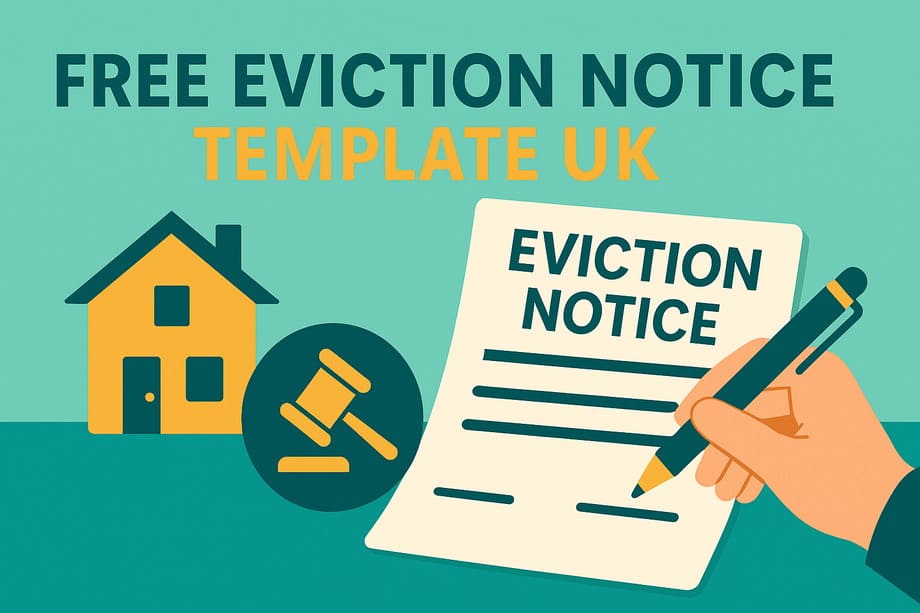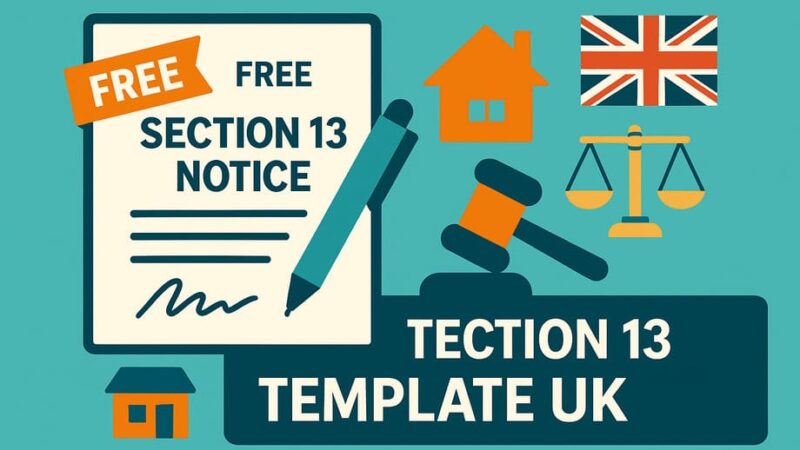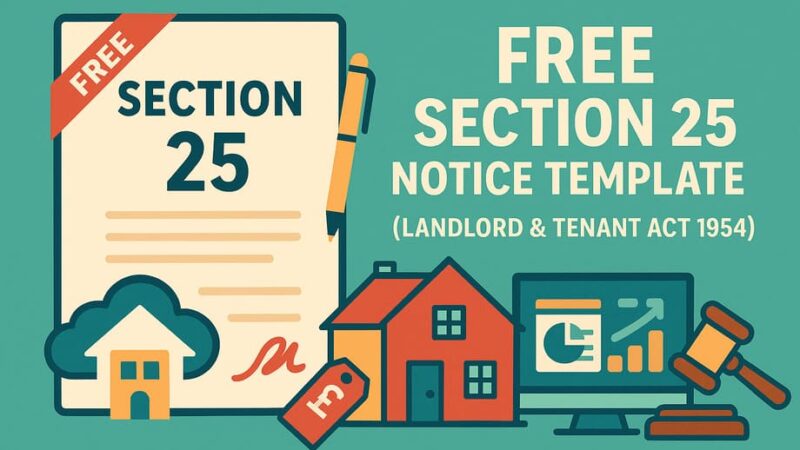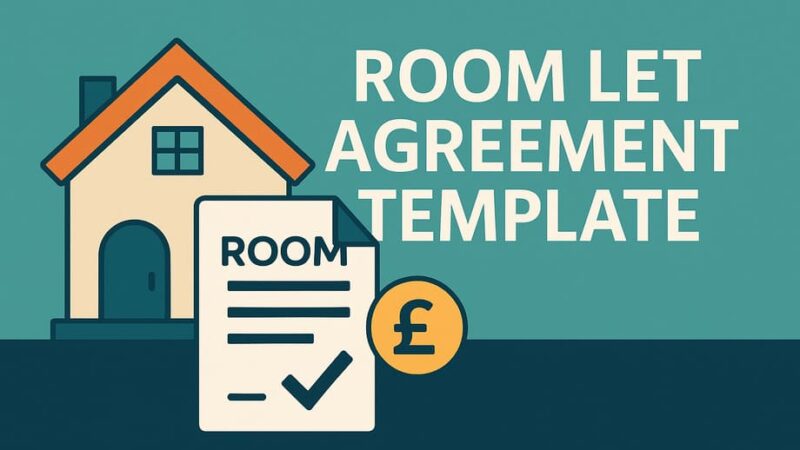Free Eviction Notice Template UK: Your Complete Landlord Guide 2025

Managing rental properties in the UK requires understanding the legal procedures for ending tenancies when circumstances demand it. Whether you’re dealing with rent arrears, tenancy breaches, or simply need to reclaim your property, having access to proper eviction notice templates and understanding the legal framework is essential for protecting your interests while respecting tenant rights.
This comprehensive guide provides free eviction notice templates for UK landlords, covering different scenarios across England, Wales, Scotland, and Northern Ireland. We’ll explore the legal requirements, timing considerations, and best practices that ensure your notices are valid and enforceable under current UK housing legislation.
Understanding Eviction Notices in the UK
An eviction notice serves as formal communication from landlord to tenant, establishing a legal timeframe for the tenant to either remedy identified issues or vacate the rental property. This document represents the initial step in formal possession proceedings and provides crucial documentation should court action become necessary.
Primary Purposes of Eviction Notices
Eviction notices fulfill several important legal and practical functions in the landlord-tenant relationship. They provide tenants with clear notification of problems and reasonable opportunity to address issues before facing possession proceedings. The notices also establish formal timelines that protect both parties’ interests while ensuring compliance with statutory requirements.
From a legal perspective, properly served eviction notices demonstrate that landlords have followed correct procedures, which proves essential if possession cases reach court. Courts expect evidence of proper notice service and appropriate timeframes before granting possession orders.
Common Grounds for Serving Eviction Notices
UK landlords may serve eviction notices for various legitimate reasons, each with specific legal requirements and procedures. Rent arrears represent the most frequent ground, occurring when tenants fail to maintain rental payments according to tenancy agreement terms. Non-payment situations require careful documentation and specific notice types depending on the level of arrears.
Breach of tenancy terms covers various violations including unauthorized pets, subletting without permission, property damage beyond normal wear and tear, or using premises for purposes not permitted under the tenancy agreement. These breaches require evidence and appropriate notice periods based on the severity of the violation.
Property damage situations involve tenant-caused damage that exceeds normal wear and tear, requiring repair costs beyond standard maintenance. Unlawful activities encompass illegal drug use, criminal behavior, or activities that disturb neighbors and violate tenancy terms.
When to Use Eviction Notices Across the UK
The timing and circumstances for serving eviction notices vary significantly across different UK jurisdictions, each with distinct legal frameworks and procedural requirements that landlords must understand and follow precisely.
End of Fixed-Term Tenancies
When fixed-term tenancy agreements reach their natural conclusion, landlords may choose not to renew and require possession of their property. This scenario typically involves “no-fault” eviction procedures that don’t require proving tenant wrongdoing but must follow specific notice periods and procedural requirements.
The timing for these notices varies by jurisdiction and tenancy type, with some requiring several months’ advance notice while others permit shorter periods. Understanding these requirements prevents delays and ensures smooth property transitions.
Tenancy Agreement Breaches
When tenants violate specific terms of their tenancy agreements, landlords may pursue fault-based eviction procedures. These situations require documenting the breach, providing appropriate notice periods for remedy, and following escalation procedures outlined in relevant housing legislation.
The severity and nature of breaches influence notice requirements, with serious violations sometimes permitting shorter notice periods while minor breaches may require longer remedy periods and multiple warnings.
Legal Framework Compliance
UK housing law provides comprehensive frameworks governing eviction procedures, with specific requirements varying between England, Wales, Scotland, and Northern Ireland. Landlords must ensure their notices comply with jurisdiction-specific requirements to maintain legal validity.
Using jurisdiction-appropriate templates and following local procedures prevents technical defects that could invalidate notices and delay possession proceedings. Professional legal advice becomes valuable when dealing with complex situations or unfamiliar procedural requirements.
Free Eviction Notice Templates
Below are professionally drafted templates for common eviction scenarios, designed to meet UK legal requirements while providing clear communication between landlords and tenants.
Section 21 Notice Template (England)
NOTICE REQUIRING POSSESSION
Housing Act 1988, Section 21
TO: [Tenant Name(s)]
PROPERTY ADDRESS: [Full Property Address]
FROM: [Landlord Name]
LANDLORD ADDRESS: [Landlord Address]
DATE OF NOTICE: [Date]
I/We hereby give you notice that possession of the above property is required after [Date - minimum 2 months from service].
This notice is served under Section 21 of the Housing Act 1988.
IMPORTANT INFORMATION FOR TENANTS:
• You have the right to remain until a court grants a possession order
• Free housing advice is available from Shelter or Citizens Advice
• Contact your local council if you need help finding alternative accommodation
• You may be entitled to benefits to help with housing costs
LANDLORD COMPLIANCE STATEMENT:
• Tenant deposit has been protected in an approved scheme
• Prescribed information about deposit protection has been provided
• Current Energy Performance Certificate has been supplied
• Valid Gas Safety Certificate has been provided (if applicable)
• Latest "How to Rent" guide has been distributed
Landlord Signature: _____________________
Date: _____________________
Section 8 Notice Template (England)
NOTICE SEEKING POSSESSION
Housing Act 1988, Section 8
TO: [Tenant Name(s)]
PROPERTY ADDRESS: [Full Property Address]
FROM: [Landlord Name]
LANDLORD ADDRESS: [Landlord Address]
DATE OF NOTICE: [Date]
I/We intend to apply to court for possession of the above property.
GROUNDS FOR POSSESSION:
Ground [Number]: [Specific ground from Schedule 2]
PARTICULARS:
[Detailed description of circumstances, including dates, amounts owed, or specific breaches]
NOTICE PERIOD:
Court proceedings may commence after: [Date]
TENANT RIGHTS:
• Seek immediate legal advice from a solicitor or Citizens Advice
• You may remain until a court makes a possession order
• Courts consider all circumstances before granting possession
Landlord Signature: _____________________
Date: _____________________
Section 173 Notice Template (Wales)
NOTICE REQUIRING POSSESSION
Renting Homes (Wales) Act 2016, Section 173
TO: [Contract-Holder Name(s)]
PROPERTY ADDRESS: [Full Property Address]
FROM: [Landlord Name]
LANDLORD ADDRESS: [Landlord Address]
DATE OF NOTICE: [Date]
I/We require possession of the above property after [Date - minimum 6 months from service].
This notice is served under Section 173 of the Renting Homes (Wales) Act 2016.
PRESCRIBED INFORMATION:
• This notice gives you at least 6 months to find alternative accommodation
• You have the right to remain until a court makes a possession order
• Free advice is available from Shelter Cymru or Citizens Advice
• Contact your local authority for housing assistance
LANDLORD DETAILS:
Name: [Landlord Name]
Contact Address: [Address]
Telephone: [Number]
Email: [Email Address]
Landlord Signature: _____________________
Date: _____________________
Eviction Procedures by UK Region
Each UK jurisdiction maintains distinct eviction procedures reflecting local housing legislation and tenant protection measures. Understanding these regional differences ensures compliance and prevents procedural errors that could delay possession proceedings.
England Eviction Procedures
English eviction law operates primarily under the Housing Act 1988, providing landlords with two main notice types for different circumstances. Section 21 notices enable “no-fault” evictions for standard tenancy endings, while Section 8 notices address specific tenant breaches.
Section 21 procedures require landlords to meet various prerequisite obligations including deposit protection, energy certificate provision, and prescribed information distribution. These requirements must be satisfied before serving notices, and failures can invalidate notices entirely.
Section 8 procedures focus on specific grounds for possession, with mandatory grounds requiring courts to grant possession if proven, while discretionary grounds allow judicial consideration of proportionality and tenant circumstances.
Wales Eviction Framework
Welsh eviction procedures operate under the Renting Homes (Wales) Act 2016, which introduced significant changes to notice requirements and tenant protections. The Act replaced traditional tenancy agreements with “occupation contracts” and modified notice periods and procedures.
Section 173 notices replaced Section 21 procedures, requiring six months’ notice for standard contract terminations. This extended notice period reflects Welsh policy priorities around tenant security and homelessness prevention.
Breach-based procedures remain similar to English Section 8 notices but incorporate additional safeguards and extended notice periods for certain grounds, particularly those involving rent arrears.
Scotland Eviction System
Scottish eviction procedures operate under the Private Housing (Tenancies) (Scotland) Act 2016, which introduced private residential tenancies with enhanced tenant protections and modified eviction procedures.
“Notice to leave” replaces traditional Section 21 procedures, requiring specific grounds for possession and varying notice periods depending on circumstances. The Scottish system emphasizes tenant security while providing landlords with appropriate possession remedies.
“Notice of proceedings” procedures enable court action when tenants don’t comply with notices to leave, providing structured escalation while ensuring tenant rights protection throughout the process.
Northern Ireland Procedures
Northern Ireland maintains distinct housing legislation governing eviction procedures, with similarities to other UK jurisdictions but incorporating region-specific requirements and timeframes.
Notice periods vary based on tenancy length and eviction grounds, with longer-term tenancies typically requiring extended notice periods. The system balances landlord property rights with tenant protection measures.
Court procedures follow established patterns while incorporating local legal frameworks and judicial practices that reflect Northern Ireland’s specific housing market conditions and legal traditions.
Understanding UK Housing Laws
Comprehensive understanding of relevant housing legislation ensures compliance and prevents costly legal errors that could invalidate notices or delay possession proceedings.
Housing Act 1988
The Housing Act 1988 provides the foundation for most English residential tenancies, establishing assured shorthold tenancies as the default arrangement and defining landlord and tenant rights and obligations.
The Act’s Section 21 and Section 8 provisions create the framework for possession proceedings, specifying grounds, notice requirements, and court procedures. Understanding these provisions enables effective possession strategy development while ensuring legal compliance.
Recent amendments have strengthened tenant protections and introduced additional landlord obligations, including deposit protection requirements and prescribed information distribution mandates.
Housing Act 1985
The Housing Act 1985 addresses social housing tenancies and establishes certain principles applicable across the housing sector. While primarily focused on social housing, some provisions affect private sector operations.
The Act’s succession provisions and security of tenure measures influence how possession proceedings develop and establish precedents for tenant protection measures subsequently incorporated into private sector legislation.
Protection from Eviction Act 1977
This crucial legislation protects tenants from unlawful eviction and harassment, establishing criminal penalties for landlords who attempt to evict tenants without following proper legal procedures.
The Act requires landlords to obtain court orders before regaining possession of properties with residential occupiers, except in very limited circumstances. Understanding these requirements prevents criminal liability and ensures lawful possession recovery.
Regional Housing Legislation
Each UK jurisdiction maintains additional housing legislation addressing local priorities and circumstances. Wales’s Renting Homes (Wales) Act 2016, Scotland’s Private Housing (Tenancies) (Scotland) Act 2016, and Northern Ireland’s housing legislation each modify standard procedures.
Staying current with regional legislative developments ensures continued compliance and enables adaptation to changing legal requirements that affect possession procedures.
Related Documentation and Templates
Effective property management requires various documentation beyond eviction notices, including tenancy agreements, rental applications, and specialized notice forms for different circumstances.
Comprehensive tenancy agreements establish clear terms and conditions that support later possession proceedings if necessary. Well-drafted agreements specify tenant obligations, landlord rights, and procedures for addressing breaches.
Including specific clauses about notice procedures, ground maintenance, and acceptable property use creates clear frameworks for future enforcement actions while protecting both parties’ interests.
Rental Applications
Thorough rental application processes enable better tenant selection and reduce the likelihood of later possession proceedings. Comprehensive applications include employment verification, reference checks, and financial assessments.
Proper screening identifies potential issues early and enables informed decisions about tenancy grants, reducing risks of rent arrears or tenancy breaches that necessitate eviction procedures.
Specialised Notice Forms
Various circumstances require specialised notice forms beyond standard eviction notices. These include notices for rent increases, property inspections, repair works, and specific breach remediation.
Having appropriate templates for different scenarios ensures consistent communication and legal compliance across all landlord-tenant interactions.
Frequently Asked Questions
How Should Eviction Notices Be Delivered?
Proper service is crucial for notice validity and must comply with tenancy agreement terms and statutory requirements. Acceptable methods typically include personal delivery to the tenant, posting through the property letterbox, recorded delivery to the tenant’s address, or email if specifically agreed in writing.
Maintaining clear evidence of service timing and method proves essential for possession proceedings. Photographs of posting, delivery receipts, or witness statements provide documentation should service be disputed later.
What Are Typical Eviction Timeframes in the UK?
Eviction timeframes vary significantly based on notice type, grounds for possession, and regional jurisdiction. Section 21 procedures typically require 2-4 months from notice service to possession, while Section 8 procedures can be faster for serious breaches but may take longer for discretionary grounds.
Court delays can extend these timeframes, particularly in areas with busy housing courts or complex cases requiring multiple hearings. Planning for extended timeframes helps manage expectations and financial planning.
How Can Landlords Obtain Eviction Notices?
Landlords can obtain eviction notice templates from various sources including legal stationers, online legal services, property management companies, and specialized legal websites offering free templates.
Using current, jurisdiction-specific templates ensures compliance with latest legal requirements and prevents technical defects that could invalidate notices. Professional legal advice becomes valuable for complex situations or unfamiliar procedures.
What Happens After Eviction Notice Expiry?
After eviction notices expire, landlords may commence court proceedings to obtain possession orders. Tenants retain the right to remain until courts grant possession, and judges consider all circumstances before making orders.
The court process involves filing claim forms, serving court papers on tenants, attending hearings, and potentially obtaining bailiff enforcement if tenants don’t comply with court orders voluntarily.
Conclusion: Effective Eviction Notice Management
Successfully managing eviction procedures requires thorough understanding of legal requirements, careful attention to procedural details, and professional communication throughout the process. Using appropriate templates ensures legal compliance while following best practices protects both landlord and tenant interests.
The templates and guidance provided offer starting points for various eviction scenarios, but every situation presents unique considerations that may require specific legal analysis. When facing complex circumstances or unfamiliar procedures, professional legal advice ensures appropriate approaches and successful outcomes.
Remember that eviction represents a significant step that affects both parties substantially. Exploring alternative solutions through communication, mediation, or support services often resolves problems without requiring formal possession proceedings, preserving relationships and reducing costs for everyone involved.
Effective property management involves preventing problems through careful tenant selection, clear communication, and prompt attention to arising issues. However, when eviction becomes necessary, proper notice preparation and service ensure efficient resolution while maintaining legal compliance and professional standards.
Last Updated on August 21, 2025 by James Cartwright







![Letter to Tenant for Late Rent Payment [Free Template] 7 Letter to Tenant for Late Rent Payment [Free Template]](https://www.yourpropertyblog.co.uk/wp-content/uploads/2025/08/letter-to-tenant-for-late-rent-payment-template-800x450.jpg)